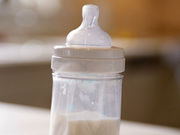Use during first seven days linked to increased risk of islet autoimmunity in infants at risk of T1DM
FRIDAY, Jan. 20, 2017 (HealthDay News) — Use of hydrolyzed cow’s milk-based formula introduced during the first seven days is associated with increased risk of islet autoimmunity in infants at increased risk of type 1 diabetes (T1D), according to a study published online Jan. 17 in Diabetes Care.
Sandra Hummel, Ph.D., from Helmholtz Zentrum Münchem in Germany, and colleagues examined whether introduction of formula based on hydrolyzed cow’s milk as the first formula correlates with reduced islet autoimmunity risk. A total of 8,676 children at increased genetic risk for T1D were monitored in the Environmental Determinants of Diabetes in the Young study.
The researchers observed no significant correlation with islet autoimmunity for infants who received extensively hydrolyzed versus nonhydrolyzed cow’s milk-based formula as the first formula during the first three months, after adjustment for confounding variables (adjusted hazard ratio, 1.38; 95 percent confidence interval, 0.95 to 2.01). Risk was significantly increased for extensively hydrolyzed formula introduced during the first seven days (adjusted hazard ratio, 1.57; 95 percent confidence interval, 1.04 to 2.38). There was no correlation with islet autoimmunity risk for use of a partially hydrolyzed or other formula as the first formula, or no formula.
“Islet autoimmunity risk is not reduced, and may be increased, by using hydrolyzed compared with nonhydrolyzed cow’s milk-based infant formula as the first formula in infants at increased genetic risk for T1D,” the authors write.
Full Text (subscription or payment may be required)
Copyright © 2017 HealthDay. All rights reserved.








